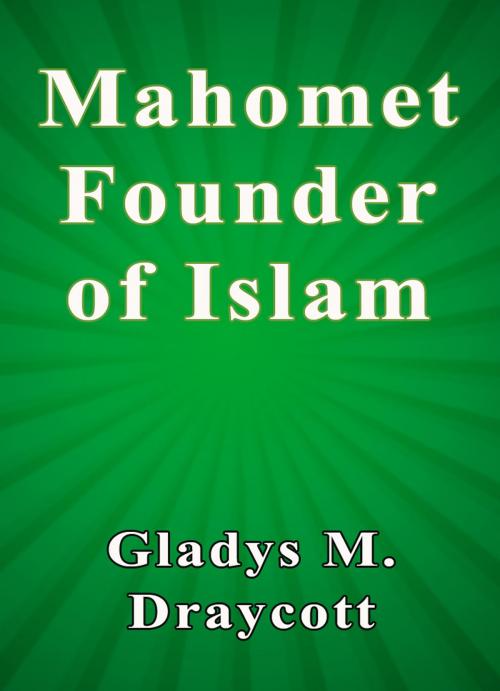| Author: | Gladys M. Draycott | ISBN: | 9781365626456 |
| Publisher: | Sai ePublications | Publication: | December 22, 2016 |
| Imprint: | Sai ePublications | Language: | English |
| Author: | Gladys M. Draycott |
| ISBN: | 9781365626456 |
| Publisher: | Sai ePublications |
| Publication: | December 22, 2016 |
| Imprint: | Sai ePublications |
| Language: | English |
The impetus that gave victory to Islam is spent. Since its material prosperity overwhelmed its spiritual ascendancy in the first years of triumph its vitality has waned under the stress of riches, then beneath lassitude and the slow decrease of power. The Prophet Mahomet is at once the glory and bane of his people, the source of their strength and the mainspring of their weakness. He represents more effectively than any other religious teacher the sum of his followers' spiritual and worldly ideas. His position in religion and philosophy is substantially the position of all his followers; none have progressed beyond the primary thesis he gave to the Arabian world at the close of his career.
He closes a long line of semi-divine teachers and monitors. After him the curtains of heaven close, and its glory is veiled from men's eyes. He is the last great man who imposed enthusiasm for an idea upon countless numbers of his fellow-creatures, so that whole tribes fought and died at his bidding, and at the command of God through him. Now that the vital history of Islam has been written, some decision as to the position and achievements of its founder may be formulated.
Mahomet conceived the office of Prophet to be the result of an irresistible divine call. Verily the angel Gabriel appeared to him, commanding him to "arise and warn." He was the vehicle through whom the will of Allah was revealed. The inspired character of his rule was the prime factor in its prevailing; by virtue of his heavenly authority he exercised his sway over the religious actions of his followers, their aspirations and their beliefs. In order to promulgate the divine ordinances the Kuran was sent down, inspired directly by the angel Gabriel at the bidding of the Lord. Upon all matters of belief and upon all other matters dealt with, however cursorily, in the Kuran Mahomet spoke with the power of God Himself; upon matters not within the scope of religion or of the Sacred Book he was only a human and fallible counsellor.
"I am no more than man; when I order you anything with respect to religion, receive it, and when I order you about the affairs of the world, then am I nothing more than man."
There is no question of his equality with the Godhead, or even of his sharing any part of the divine nature. He is simply the instrument, endowed with a power and authority outside himself, a man who possesses one cardinal thesis which all those within his faith must accept.
The impetus that gave victory to Islam is spent. Since its material prosperity overwhelmed its spiritual ascendancy in the first years of triumph its vitality has waned under the stress of riches, then beneath lassitude and the slow decrease of power. The Prophet Mahomet is at once the glory and bane of his people, the source of their strength and the mainspring of their weakness. He represents more effectively than any other religious teacher the sum of his followers' spiritual and worldly ideas. His position in religion and philosophy is substantially the position of all his followers; none have progressed beyond the primary thesis he gave to the Arabian world at the close of his career.
He closes a long line of semi-divine teachers and monitors. After him the curtains of heaven close, and its glory is veiled from men's eyes. He is the last great man who imposed enthusiasm for an idea upon countless numbers of his fellow-creatures, so that whole tribes fought and died at his bidding, and at the command of God through him. Now that the vital history of Islam has been written, some decision as to the position and achievements of its founder may be formulated.
Mahomet conceived the office of Prophet to be the result of an irresistible divine call. Verily the angel Gabriel appeared to him, commanding him to "arise and warn." He was the vehicle through whom the will of Allah was revealed. The inspired character of his rule was the prime factor in its prevailing; by virtue of his heavenly authority he exercised his sway over the religious actions of his followers, their aspirations and their beliefs. In order to promulgate the divine ordinances the Kuran was sent down, inspired directly by the angel Gabriel at the bidding of the Lord. Upon all matters of belief and upon all other matters dealt with, however cursorily, in the Kuran Mahomet spoke with the power of God Himself; upon matters not within the scope of religion or of the Sacred Book he was only a human and fallible counsellor.
"I am no more than man; when I order you anything with respect to religion, receive it, and when I order you about the affairs of the world, then am I nothing more than man."
There is no question of his equality with the Godhead, or even of his sharing any part of the divine nature. He is simply the instrument, endowed with a power and authority outside himself, a man who possesses one cardinal thesis which all those within his faith must accept.















